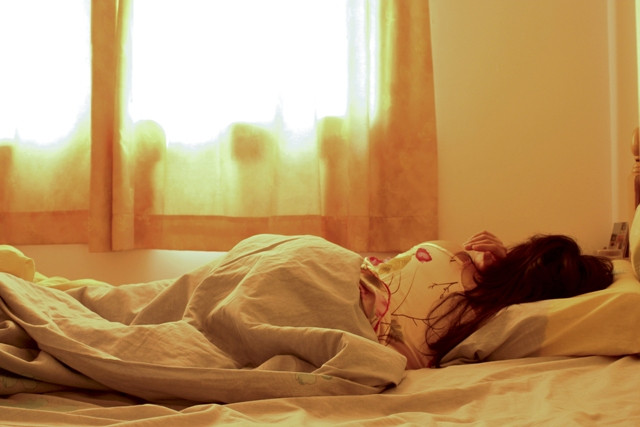Sleep speaks: What your slumber pattern says about you
Poor sleep is a great raconteur, often revealing an easily curable problem lurking beneath the surface

Poor sleep is a great raconteur, often revealing an easily curable problem lurking beneath the surface. STOCK IMAGE
Symptom: Sleeping for 14 — or more-hours at a stretch
What it may mean: An underactive thyroid or a latent infection
Most people need seven to nine hours of sleep to feel revitalised. “It should give you pause if you’re sleeping more than 10 hours day-in, day-out,” says Andrew Varga of the Division of Pulmonary, Critical Care and Sleep Medicine at NYU Langone Medical Centre. One possible cause is hypothyroidism, which tends to affect more women than men. Its slow onset causes weight gain and fatigue, which many mistakenly chalk up to aging. But sleeping too many hours may indicate a need to test your thyroid’s ability to regulate metabolism. Oversleeping can also be your body’s reaction to a latent infection, Varga says. In that case, sleep should be cut short.
Symptom: Waking up exhausted every morning
What it may mean: Sleep apnea or depression
If you’re getting enough hours of snooze time but still feel sluggish upon waking up, you could have sleep apnea — difficulty breathing during sleep that affects millions of people globally. Sleep apnea disrupts the sleep cycle, constantly interrupting sleep patterns. “Somebody might wake up hundreds of times a night, but think they woke up only once or twice,” says John Winkelman, a sleep researcher at Massachusetts General Hospital. If you think you might have the condition, try sleeping on your back and see if you feel well-rested in the morning. If that doesn’t work, talk to your doctor about the issue. Sleep apnea is linked to a number of adverse health outcomes, including heart-attack. Depression is another condition that goes hand-in-hand with sleep problems. So, if you’re still feeling weary after a full-night’s sleep, it could be a mood disorder and a talk with a therapist may be in order.
Symptom: Waking up at 5:00am regardless of sleep time
What it may mean: Circadian rhythm disorder
We have an internal mechanism known as the circadian rhythm or body clock, which adjusts bodily functions. Sleep drive is part of the circadian rhythm and it increases as the day goes on, until we get tired and fall asleep. So, if you wake up every day before the sun is up (even on weekends) and can’t go back to sleep, you may have simply spent your sleep-drive, according to Winkelman. No big issue. However, if you’re consistently up too early, you may have a circadian disorder called advanced sleep phase syndrome. Patients are encouraged to keep a dark, quiet room during sleep and a well-lit room upon waking up. Bright light exposure in the evening should be avoided, and regular hours of eating and other activities should be enforced.
Symptom: Not sleeping without late night TV
What it may mean: Anxiety
If you’ve always fallen asleep to popular daily soap reruns or commercials, the television may just be part of your night routine. But the TV may also distract you from your own thoughts, suggests research by the Health & Social Care Information Centre, UK. A dark and quiet room may bring psychological problems to the fore. Studies found that the TV helps deflect feelings and compensates for worries. Another reason to reconsider your dependence on the tube: The TV’s light increases stress hormones, so sleep experts advise finding more legitimately calming strategies before bed, such as meditation or reading fiction. Dr Guy Meadows, clinical director of The Sleep School, a West London clinic, says, “It’s ideal to dim down the lights and turn the TV off as bedtime approaches as sleep is vital for the regulation of our mood.”
Symptom: Waking up and not being able to go back to sleep
What it may mean: Restless leg syndrome
Restless leg syndrome is a movement disorder that causes sore sensations in the legs. These sensations get worse during periods of rest, especially just before sleeping at night. If you find yourself stretching before bed and then in the middle of the night, you’re kicking your spouse or have an urge to get up and move, you might have the condition. The syndrome stems from an abnormality in dopamine, the brain chemical involved in motor control and nerve cells. It usually starts in the early evening and peaks in the middle of the night to rouse you from sleep. This rare condition is linked to an increase in heart attacks and strokes. On the bright side, it’s easy to test for and control with prescription medicine.
Symptom: Tossing and turning with a racing heart
What it may mean: Overactive thyroid
Maybe you’re flustered by a horror flick or anxious about tomorrow’s work meetings. But, if you have consistent insomnia, rapid heartbeat throughout the night and irritability during the day, you may have hyperthyroidism, which is responsible for disturbing sleep, according to physicians. Too much thyroid-hormone production inflicts chaos on the metabolism and results in rapid weight loss in a short period of time. Another possibility is Graves’ disease, an immune disorder that causes restlessness and troubled sleeping. If it’s not The Walking Dead giving you jitters, then we recommend you consult a doctor.
Published in The Express Tribune, February 25th, 2015.
Like Life & Style on Facebook, follow @ETLifeandStyle on Twitter for the latest in fashion, gossip and entertainment.



















COMMENTS
Comments are moderated and generally will be posted if they are on-topic and not abusive.
For more information, please see our Comments FAQ